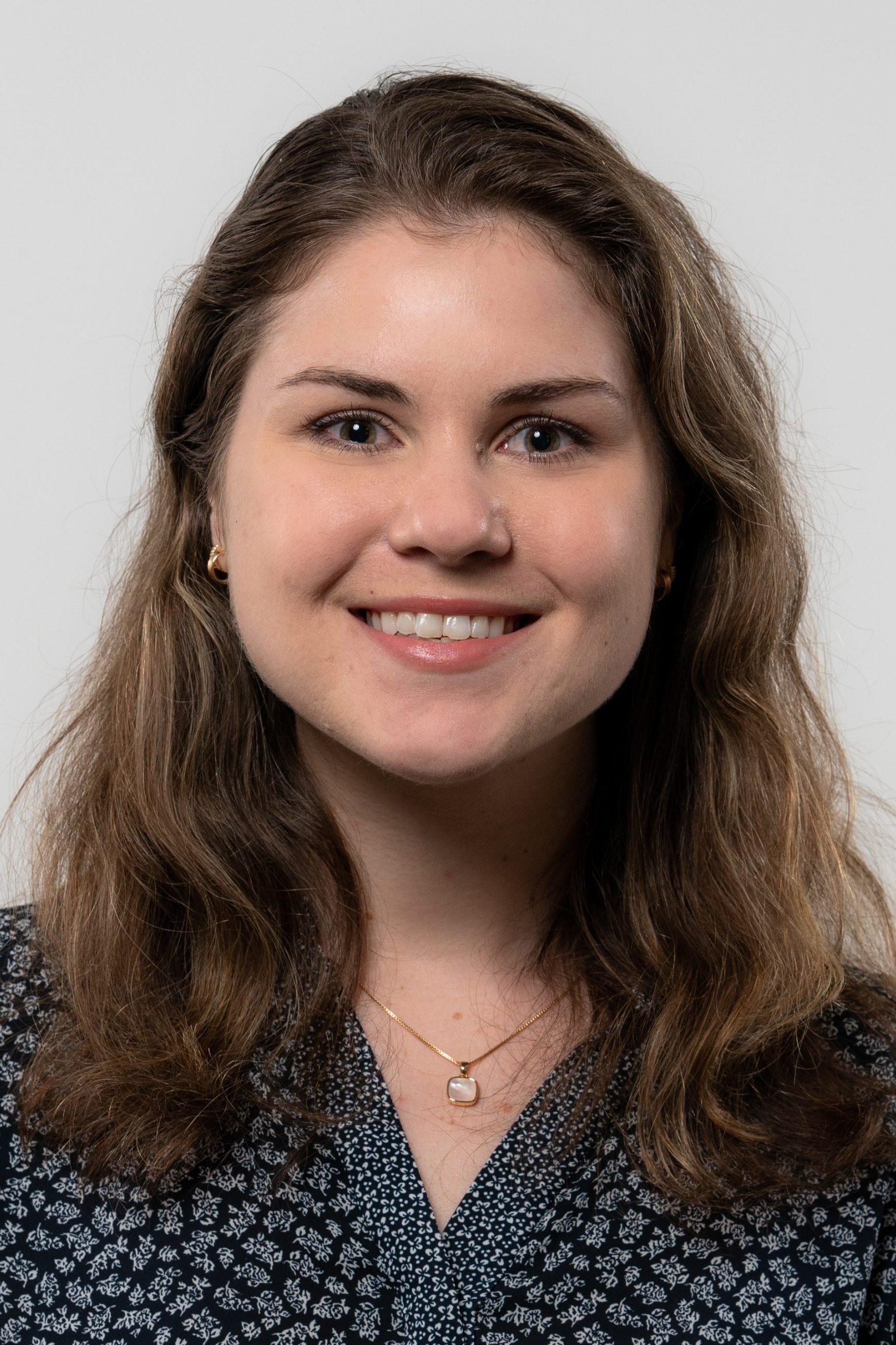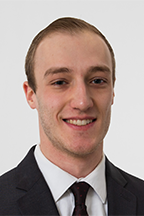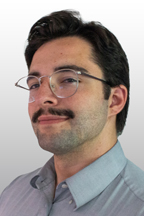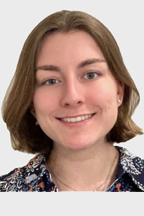Our training program in its fourth year and currently supports four pre-doctoral graduate students annually.
Hanna Anderson
Department of Biomedical Engineering
Project(s): Investigating the Mechanoresponse of Dural Cells under Acoustic Radiation Force and its Contribution to Cranial Bone Regeneration
Mentor: Yusuf Khan, Ph.D.
Hanna Anderson is a Ph.D. candidate in The Cato T. Laurencin Institute for Regenerative Engineering working under Dr. Yusuf Khan. Her ongoing predoctoral research explores the potential of acoustic radiation force produced by low-intensity ultrasound in tandem with biomaterial-based cell therapies to improve bone regeneration. The main clinical need motivating her research is the high prevalence of pediatric patients suffering from bone resorption following decompressive craniectomy and subsequent cranioplasty. In the case of traumatic brain injury, large pieces of cranial bone may be removed to accommodate brain swelling, then later replaced once the swelling has subsided. Unfortunately, the replaced bone tends to deteriorate more readily in pediatric patients, and the synthetic grafts used for reconstruction are outgrown as the child ages, requiring multiple revision surgeries. Hanna’s work aims to use ultrasound to stimulate the dura mater, a mechanosensitive tissue that lies directly under the skull and participates in cranial bone healing and development. In this novel approach, her objective is to facilitate cranial bone regeneration by mechanically stimulating dural cells with ultrasound to exploit inherent cell-cell interactions, thereby evoking bone healing through collaborative signaling between the dura mater and the skull. The primary goal is to realize a clinically translatable tool that could be implemented as a noninvasive method for mitigating cranial bone resorption and for improving patient quality of life.
Kevin Grassie
Department of Biomedical Engineering
Project(s): Modulated Ultrasound-Derived Acoustic Radiation Force and its Local Mechanical, Cellular, and Osteogenic Effects on Cell-Hydrogel Constructs for Bone Repair
Mentor: Yusuf Khan, Ph.D.
Kevin Grassie is a Ph.D. candidate in the Department of Biomedical Engineering at the University of Connecticut and has been a part of the Cato T Laurencin Institute for Regenerative Engineering since 2018, working under the mentorship of Dr. Yusuf Khan. He holds a B.S.E. in Biomedical Engineering and a B.S.E. in Engineering Physics from the University of Connecticut.
Kevin’s experience in these fields brings a multidisciplinary approach to regenerative engineering problems that lie at the intersection between cell biology, biomaterial scaffolds, physical stimulation, and computational mechanics. Kevin’s research focuses on studying the local mechanical, cellular, and osteogenic effects of modulated low-intensity pulsed ultrasound (LIPUS) applied to cell-hydrogel constructs in order to improve bone regeneration in complex defects. His work has afforded him a deep understanding of several disciplines, including ultrasound physics, solid mechanics, computational modeling, mechanical characterization, microscopy, cell culture, and skeletal biology. His research will contribute to a better understanding of the mechanisms behind LIPUS stimulation of 3D cell-hydrogel constructs, and inform the design of loading therapies that enhance bone formation and maintenance. During his Ph.D. studies, Kevin has presented talks on his work at the 2022 Society for Biomaterials (SFB) Annual Meeting and the 2023 Summer Biomechanics, Bioengineering, and Biotransport Conference. He has also received 1st Place in the 3-Minute Thesis competition at the 2022 SFB meeting and an NIH Travel Award to present a poster at the 2024 Tissue Engineering and Regenerative Medicine International Society World Congress.
After his Ph.D., Kevin seeks to pursue a scientific career where he can apply his multidisciplinary research skills and experience to new and exciting domains, while also having opportunities for teaching and science communication. Specifically, he is fascinated by the prospect of using regenerative engineering principles to address unique biomedical challenges in the context of spaceflight and microgravity environments. Motivated by decades of evidence that new frontiers spark the development of transformative technologies, he believes that regenerative engineering research in space can provide valuable new insights for improving human health and tissue regeneration back here on Earth too.
Maxwell Landolina
Department of Biomedical Engineering
Project(s):
• In-Space Manufacturing of a Janus Base Nano-Matrix for Cartilage Repair
• Optimization and Application of a Janus Base Nano-Matrix for Cartilage Regeneration and Cell Delivery
Mentor: Yupeng Chen, Ph.D.
Maxwell is a Ph.D. candidate in the Biomedical Engineering Department at the University of Connecticut Storrs. Inspired by family members who suffer from cartilage degradation, he decided to begin his doctoral studies in 2022. His research primarily focuses on a novel nanomaterial called the Janus Base Nano-Matrix (JBNm).
His work implements unconventional interdisciplinary concepts into regenerative engineering, including statistical optimization of tissue scaffolds and the use of microgravity to enhance biomaterial manufacturing. By utilizing response surface methodology and machine learning techniques, Maxwell models how changes in a scaffold’s structure can impact biological outcomes. In collaboration with NASA, the ISS National Laboratory, Axiom Space, and other private companies, he fabricates JBNm aboard the International Space Station. The lack of gravitational forces permits the assembly of thicker, more homogeneous nanomaterials. These structural changes translate into better biological efficacy when applied back here on Earth. The goal of his research is to improve the JBNm’s ability to regenerate cartilage tissue and act as a cell delivery tool for osteoarthritis.
After his Ph.D., Maxwell’s aim is to work at the cusp of treatment development in the regenerative medicine industry.
Madison Hicks
Department of Chemical & Biomedical Engineering
Project(s):
• Light Soft-Actuated Bionic Regenerative Engineering (Light SABRE) Brace System
Mentor: Cato T. Laurencin, M.D., Ph.D.
Madison Hicks is a Ph.D. candidate in the Chemical & Biomolecular Engineering Department at the University of Connecticut. In 2024, she joined The Cato T. Laurencin Institute for Regenerative Engineering, where she works directly under the mentorship of Dr. Cato T. Laurencin.
Madison’s ongoing research builds on a project inherited from Godwin Dzidotor, a former T32 Doctoral Training Program Fellow. Her work centers on the development of the Light Soft Actuated Bionic Regenerative Engineering (Light SABRE) knee brace system, which is designed to promote cartilage regeneration in osteoarthritis patients. Of the many forms of arthritis, osteoarthritis remains the most prevalent, causing progressive joint pain, stiffness, and loss of mobility for millions worldwide. Capturing the interdisciplinary nature of regenerative engineering, Madison’s work combines principles from engineering, biology, materials science, and machine learning to modulate the complex forces surrounding the knee. Driven by pneumatic actuators, the Light SABRE brace system is designed to precisely regulate joint mechanics in real-time, creating and maintaining a biomechanical environment that encourages cartilage regeneration. In this novel approach, Madison’s work addresses a critical unmet need by offering a promising non-invasive strategy to restore joint health for a condition that currently has no cure.
Past Fellows
Godwin Dzidotor (4/2018 – 7/2025)
Project(s): Light Soft-Actuated Bionic Regenerative Engineering (SABRE)
Injectable and Biodegradable Piezoelectric Hydrogel for Medical Applications
Articular Cartilage Regeneration using Biodegradable Piezoelectric Nanofiber Hydrogel with Ultrasound Treatment
Mentor: Cato T. Laurencin, M.D., Ph.D.
Travis Wallace (8/2023 – 7/2025)
Project(s): Regenerative engineering strategies for aged bone, especially those that are highly translatable. One such strategy under investigation in the Kuhn Lab is local and sustained delivery of drugs via novel biomaterials.
Mentor: Liisa T. Kuhn, Ph.D.
Currently a PhD Candidate
Andreia Cadar (10/1/2022 – 9/30/2024)
Project(s): Mechanisms of Flu Induced Muscle Damage with aging and potential regenerative interventions
Mentor: Jenna Bartley, Ph.D.
Currently a PhD candidate in the UConn Center on Aging and Department of Immunology.
Steven Toro (10/1/2022 – 9/30/2024)
Project(s): In situ formed microneedles for local delivery of myogenic and immunomodulatory
Mentor: Ali Tamayol, Ph.D.
Currently a Biomedical Science Ph.D. student at the University of Connecticut Health Center, studying Skeletal Biology and Regeneration.
Tra Vinikoor (10/01/2023 - 07/19/2024)
Project(s):
- Injectable and biodegradable piezoelectric hydrogel for osteoarthritis treatment
- Single-Administration Self-Boosting Microneedle Patch For The Treatment
Therapeutic Deep Eutectic Solvent Of Lidocaine And Vitamin C (T-Livit) For Pain-Relief, Applied In Osteoarthritis Pain Treatment
Mentor: Thanh D. Nguyen, Ph.D.
Rachel Marchini (07/01/2022 - 06/30/2024)
Project(s): Development of the synthetic artificial stem cell (SASC) for use in a rat model of Osteoarthritis (OA)
Mentor: Cato T. Laurencin, M.D., Ph.D.
Currently a PhD student in chemical and biomolecular engineering at the University of Connecticut.
Heather Wanczyk (07/01/2022 - 06/30/2024)
Project(s): Engineering Pediatric-Sized Airways using Advanced 3D Bioprinting Technology
Mentor: Christine M. Finck, M.D.
Currently a PhD student in Biomedical Science at the University of Connecticut Health Center- Department of Cell Biology.
Keaven Caro (10/1/2022 – 9/30/2023)
Project(s):
- Resolve C1QL3 trans-synaptic adhesion complex at synapses and determine its role in synaptic density
- Identify regulatory mechanism of C1QL3-mediated cell-cell adhesion
Mentor: David Martinelli, Ph.D.
Currently a M.D./Ph.D. student in the Martinelli lab in the Department of Neuroscience at the University of Connecticut Health Center.
Jacob Quint, Ph.D. (9/1/2021 – 8/31/2023)
Project(s):
- Aerobic exercise and scaffolds with hierarchical porosity synergistically promote functional recovery post volumetric muscle loss (VML)
- Approximating scaffold printability utilizing computational methods
Mentor: Ali Tamayol, Ph.D.
Currently a Post doctoral researcher, UConn Health Center
T32 Alumni - Keep in Touch
If you have recently moved, changed jobs, retired, earned an advanced degree, or celebrated a career milestone, please contact Program Manager Jolene Monahan Wilding at monahanwilding@uchc.edu. This information will be used to update your record in our alumni database.



